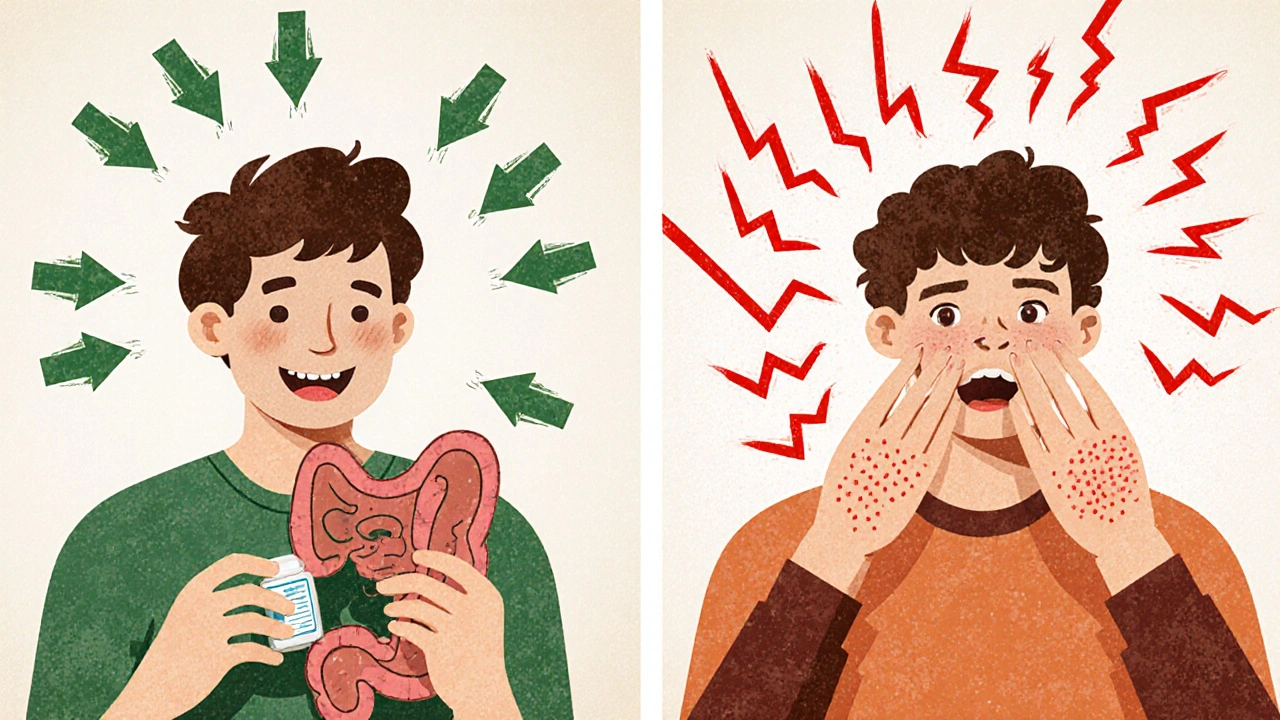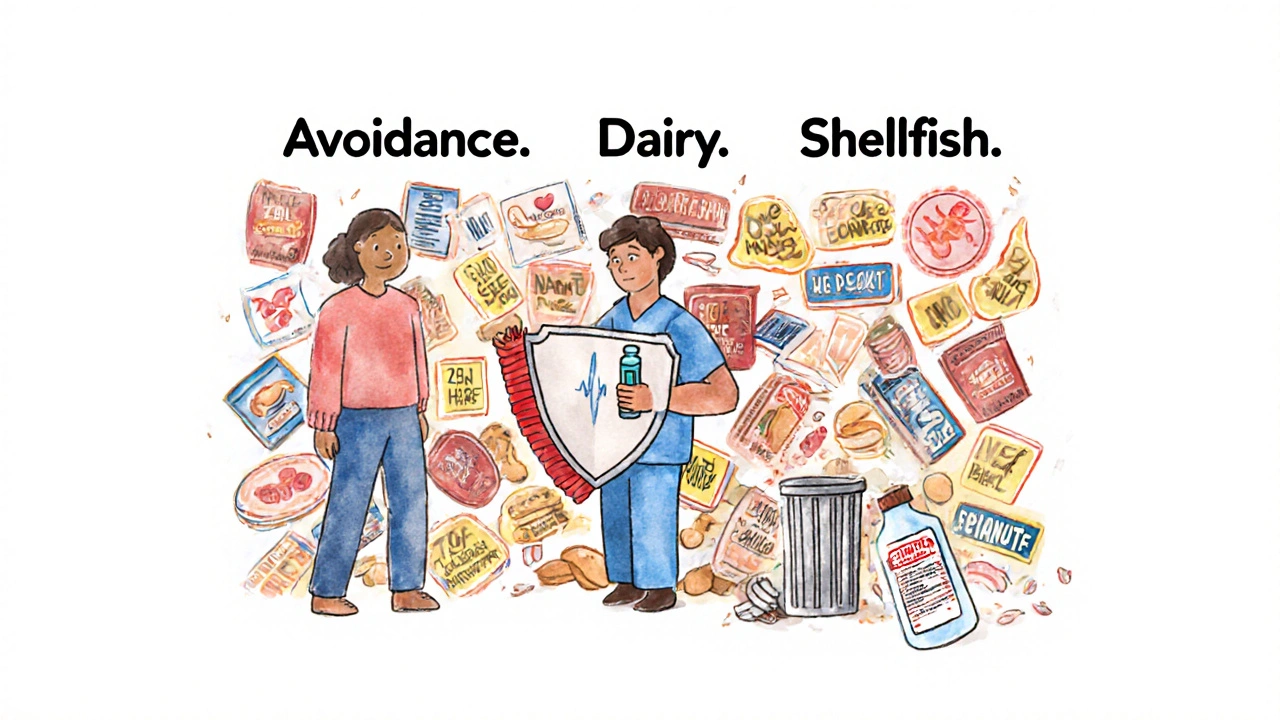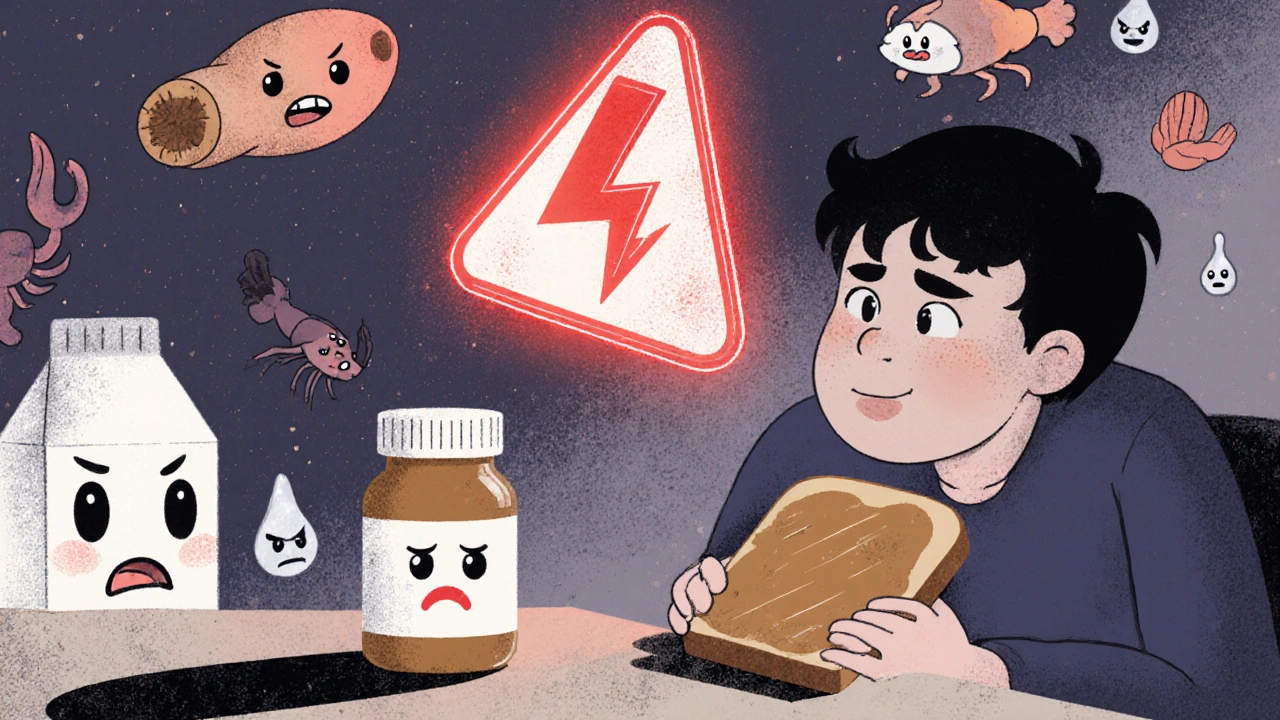People with food allergies often feel trapped. One bite of peanut, dairy, or shellfish can trigger a reaction that ranges from uncomfortable to life-threatening. Many search for hidden solutions-supplements, detoxes, enzyme pills-anything that might let them eat without fear. Pancrelipase, a prescription enzyme blend, shows up in these searches. But here’s the hard truth: pancrelipase does not treat food allergies. It doesn’t stop your immune system from reacting to allergens. And using it for that purpose could be dangerous.
What Pancrelipase Actually Does
Pancrelipase is a mix of digestive enzymes-lipase, protease, and amylase-extracted from pig pancreas. It’s prescribed for people whose bodies can’t make enough of these enzymes on their own. That includes folks with cystic fibrosis, chronic pancreatitis, or after pancreatic surgery. These conditions break down the pancreas’s ability to digest fats, proteins, and carbs. Without enzymes, food passes through undigested, causing bloating, diarrhea, and malnutrition.
Pancrelipase replaces what’s missing. It breaks down food in the small intestine so nutrients can be absorbed. It doesn’t touch the immune system. It doesn’t neutralize allergens. It doesn’t prevent histamine release. It’s a digestive aid, not an allergy shield.
Why People Think It Might Help Food Allergies
The confusion comes from two places. First, some digestive issues mimic food allergy symptoms. Bloating after milk, gas after bread, stomach cramps after eggs-these can look like allergies, but they’re actually enzyme deficiencies. Lactose intolerance isn’t a milk allergy. It’s a lack of lactase. People with this often feel better on pancrelipase, and wrongly assume it’s fixing an allergy.
Second, some alternative health sites promote enzyme therapies as “allergy cures.” They claim that undigested food particles leak through the gut and trigger immune reactions. This idea-called “leaky gut syndrome”-isn’t scientifically proven as a cause of food allergies. Even if gut permeability plays a role in some cases, pancrelipase doesn’t fix it. It just helps break down food faster. It doesn’t seal the gut lining or calm immune cells.
The Real Risk of Using Pancrelipase for Allergies
Trying to use pancrelipase to avoid an allergic reaction is like using a raincoat to stop a bullet. You might feel like you’re protected, but the danger is still there-and you’re not prepared for it.
Here’s what can go wrong:
- You eat a food you’re allergic to because you took pancrelipase. You feel fine at first-no bloating, no gas-so you think it’s safe. Then you get hives, swelling, or anaphylaxis. The enzymes didn’t stop the immune response.
- Pancrelipase can cause side effects: nausea, diarrhea, stomach cramps, or even high uric acid levels that lead to gout.
- It’s a prescription drug. Taking it without medical supervision means you’re not being monitored for interactions or long-term risks.
- Delaying proper allergy management-like carrying epinephrine or seeing an allergist-can cost you your life.

What Actually Helps with Food Allergies
If you have a food allergy, the only proven methods are:
- Avoiding the allergen completely
- Reading labels carefully
- Carrying an epinephrine auto-injector at all times
- Working with an allergist to confirm your triggers
- Considering oral immunotherapy (OIT) if it’s right for you
Oral immunotherapy isn’t a cure, but it’s a medically supervised process where you’re given tiny, increasing doses of the allergen over months or years. The goal is to raise your reaction threshold. Some people can tolerate small amounts after OIT. But it’s not for everyone. It requires a specialist, regular monitoring, and carries risks. Still, it’s science-backed. Pancrelipase is not.
When Pancrelipase Might Be Used Alongside Food Allergies
There’s one legitimate overlap: if someone has both a food allergy and a pancreatic enzyme deficiency. For example, a child with cystic fibrosis who’s also allergic to milk protein. They need pancrelipase to digest food properly. They also need to avoid milk. The two conditions are separate. The enzyme helps digestion. The avoidance protects the immune system. They’re managed together-but not confused.
In this case, pancrelipase isn’t helping with the allergy. It’s helping with digestion. The allergy rules stay the same.

What to Do If You’re Considering Pancrelipase for Allergies
If you’ve heard someone say pancrelipase helped them “get over” a food allergy, be skeptical. That’s anecdotal-and potentially misleading. Here’s what to do instead:
- See an allergist. Get tested. Confirm exactly what you’re allergic to. Many people think they’re allergic to gluten or dairy when it’s actually a different issue.
- If you have digestive symptoms with no confirmed allergy, talk to your doctor about possible enzyme deficiencies. A stool test can check for fat malabsorption.
- Never take pancrelipase without a prescription. It’s not an over-the-counter supplement. It’s a regulated drug with risks.
- Don’t replace epinephrine or avoidance with enzymes. No pill can replace vigilance when your life is at stake.
Bottom Line
Pancrelipase has a clear, vital role in digestive health-for people with pancreatic insufficiency. But it has no role in treating food allergies. It doesn’t block immune reactions. It doesn’t reduce sensitivity. It doesn’t make allergens safe.
Believing otherwise puts you at risk. Food allergies are serious. They don’t respond to digestive aids. They respond to avoidance, planning, and medical care. If you’re tired of living in fear, talk to an allergist-not a supplement marketer. There are real, science-backed ways forward. Pancrelipase isn’t one of them.

Marcia Martins
October 28, 2025 AT 12:09Kevin McAllister
October 29, 2025 AT 02:36Robert Bowser
October 29, 2025 AT 18:32Sue M
October 30, 2025 AT 22:37Rachel Harrison
November 1, 2025 AT 01:26Tiffanie Doyle
November 1, 2025 AT 09:19james landon
November 1, 2025 AT 12:34Jenn Clark
November 2, 2025 AT 02:44L Walker
November 3, 2025 AT 14:48giri pranata
November 3, 2025 AT 21:11Stuart Rolland
November 4, 2025 AT 08:46Charlos Thompson
November 6, 2025 AT 01:20Kent Anhari
November 7, 2025 AT 10:56